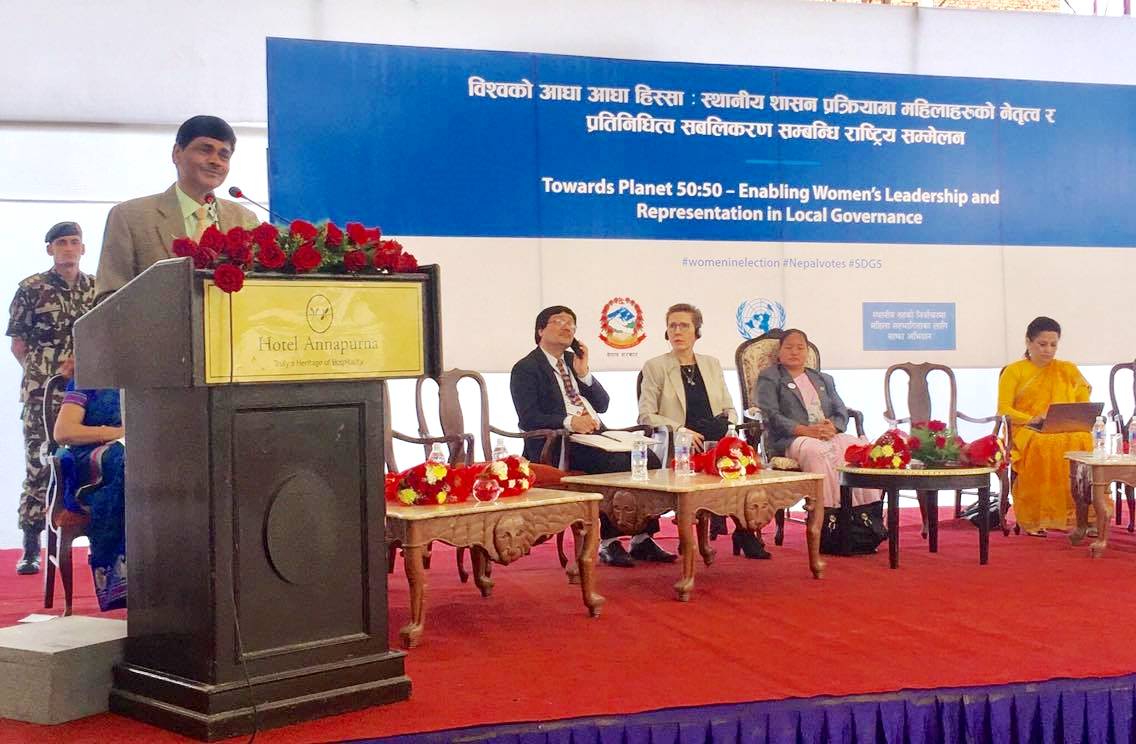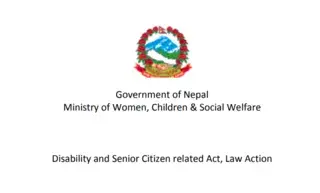KATHMANDU, APRIL 21 — I am contesting the upcoming election with my headscarf on, duly following the advice of my mother-in-law. But I have offered my full support to my daughter-in-law to contest the polls without headscarf on,” said Kausilya Tharu, a participant from Bara district at the two-day national conference on women's leadership and representation.
Kausilya is one of the 39 women participants contesting the local polls who came all the way across Nepal to participate in the national conference, ‘Towards Planet 50:50-Enabling Women’s Leadership and Representation in Local Governance’, organised by the Election Commission Nepal, together with the United Nations and Sajha Abhiyan (Women's leaders' Coalition) in Kathmandu on 20-21 April 2017.

With the promulgation of a new constitution that contains many positive provisions to advance gender equality and women's empowerment, as well as due to Nepal's national and international commitments for the same causes, there has been significant progress in the country in recent years. However, many serious challenges remain and a coherent approach among political parties is needed to ensure women's leadership and representation in local governance.
The two-day conference is a response to identified shortfalls in terms of women's participation and representation. Various speakers have highlighted the message that women's participation is more than numbers and filling quotas, and that the country needs to aim for female representation and participation that substantially transforms decision making in the political sphere.
Speaking at the inauguration session on Thursday, Rt. Honorable Speaker of the Parliament, Onsari Gharti Magar, said that women’s participation in local governance as voters is simply not enough. “What is more crucial is to push for greater leadership roles in the pursuit of national development.”
Chief Election Commissioner, Dr. Ayodhee Prasad Yadav, requested all political parties to encourage women's candidacy in all posts as far as possible. “We need to put an end to the existing socio-economic and cultural discrimination against women to see them in the leadership roles.”
“Quotas help, special measures help, interest groups help, but it is when knowledge is put into practice that changes come,” said UN Resident Coordinator Valerie Julliand. “Transforming policy into practice highlights the tangible challenges and opportunities that lie ahead. At the end of it all, we need to have women who want to come to the table – this requires everyone supporting women.”
Women’s political empowerment and equal access to leadership positions at all levels are fundamental to achieving the Sustainable Development Goals (SDGs) and a more equal world. The Convention on the Elimination of All Forms of Discrimination Against Women (CEDAW), ratified by Nepal in 1991, calls on state parties “to take appropriate measures to eliminate discrimination against women in the political and public life”.
Similarly, the Constitution of Nepal (2015), Article 38-4, states that “women shall have the right to participate in all bodies of the State on the basis of the principle of proportional inclusion.” Regardless, women continue to be significantly under-represented in political and electoral processes everywhere in the world – as voters, candidates, elected representatives or electoral administrators. Nepal is no exception.
Many of the candidates contesting the election from different districts shared a common message that there are still huge obstacles for women entering politics and this is something they should collectively fight, to enable more women leaders and representatives. “The barriers, however challenging, that stop women from entering into politics can be easily overcome if both women leaders and parties are committed,” said Member of Parliament, Kunti Shahi.
The Government of Nepal (GoN) has announced 14 May 2017 as the date for the election of local bodies and preparations are underway. The local bodies for which elections will be held include 481 Rural Municipalities, 246 Municipalities, 13 Sub- Metropolitan Cities and 4 Metropolitan Cities. These elections will result in at least 13,360 women being elected decision makers in 6,680 wards.

The conference, aimed at strengthening knowledge and capacities among both political actors and women from across Nepal, brought together over 300 women leaders from the 75 districts of Nepal who discussed how they could take maximum benefit from the opportunities provided by the new constitution, the electoral laws and political processes. Among these, 13 will contest for the post of Mayor, 16 for Deputy Mayor, 5 for Ward chair and 4 for Ward member. If elected, they will contribute to the progress of recent years and strengthen Nepal’s position as a leader on the issue of women’s representation in politics.
In the words of UN Resident Coordinator Valerie Julliand, “When women prosper, all of society flourishes, and political inclusion and participation, as well as access to education, are instrumental in attaining prosperity.”


